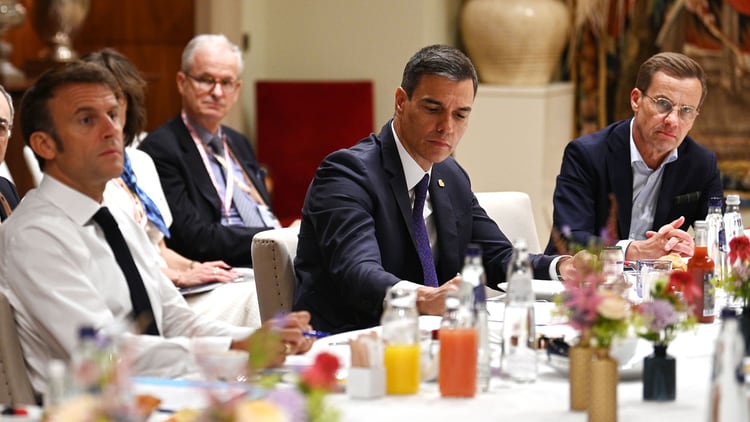Ángel Collado
Pedro Sánchez has begun the rotating presidency of the European Council that Spain will hold for the next six months, and he has done so in electoral terms, assuming that he will remain in power after the general elections on 23 July.
The socialist leader only plans to re-edit his front of left-wing and pro-independence parties to continue as head of the Executive when August passes, or to prolong his interim in office during the autumn in case the results are confusing or subsequent pacts become impossible, as happened in the 2015 elections, which had to be repeated six months later.
Sánchez made it clear after the last European Council that he will not inform or report to the main opposition party on his actions as leader of the Council because he rules out the possibility of being relieved at the polls. Before bringing forward the general elections scheduled for December as a response to the socialist disaster in the May elections, the head of the executive had already planned the Spanish presidency without counting at all on the PP.
Now, three weeks before the elections, in addition to keeping Alberto Núñez Feijóo out of the picture, Sánchez is taking advantage of his European institutional prominence to campaign against his rival, who, according to all the polls except the government’s CIS survey, is the sure winner of the elections.
The head of the Executive took to Brussels the core of his message to stop Feijóo: that the PP, with Vox in hand, is bringing the extreme right to power. The president of a coalition cabinet with five communist ministers in his cabinet is campaigning against the PP’s regional and municipal pacts with Vox because he considers the latter an ‘ultra’ party.
Sánchez then travelled to Kiev to ratify the political, military and financial support of the EU and Spain for Zelenski in the face of Putin’s invasion, while his populist partners in the Executive (Podemos, Sumar and their various brands) defend the opposite: equidistance, disengagement from NATO and an end to the delivery of weapons to Ukrainian troops.
The socialist leader uses the position, means and facilities of the State to attack Feijóo by claiming that there are “European leaders” who are displeased with “the involution” in Spain, a term used by the PSOE to refer to the PP’s local agreements with Vox. The PP, in addition to denouncing the abuse before the Electoral Board, has responded to the manoeuvre by publicising the electoral programmes of Sánchez’s allies with ministers in his cabinet.
Sánchez had designed the festivities of the rotating presidency of the Council to show off his best and right at the end of the legislature, but the bringing forward of the elections complicates his electoral campaign and his own performance of this presidency, which he presented as fundamental for the EU.
Except for the EU summit with the Community of Latin American and Caribbean States scheduled to take place in Brussels on the 17th and 18th of this month (the halfway point of the election campaign), the president of the government will attend all subsequent meetings as acting president. This will be the case, at least until September or October.
For the great photo of the presidency, on the occasion of the extraordinary European Council on 6 October, with all the heads of state and government of the EU, the head of the Executive had reserved the Alhambra in Granada. With the new Cortes to be constituted on 17 August and the King’s first consultations to propose candidates for investiture expected to begin in early September, Sánchez is acting as if he is certain to be in the Alhambra a month later.
For his part, Feijóo is asking for papers and setting up teams as if he were to take over the presidency of the Council at the same time. By then the polls will have decided whether Sánchez is on his way out or not.







